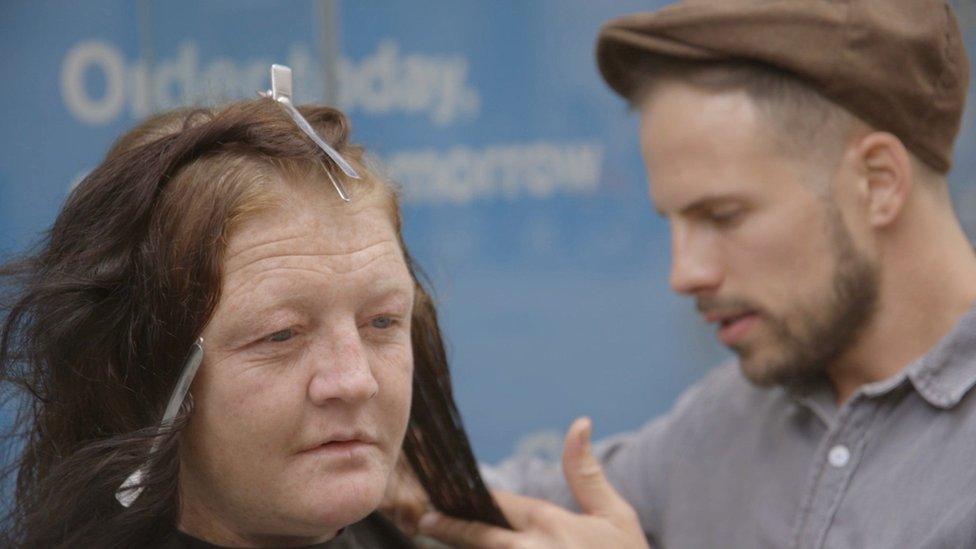'I am housemaid, hear me roar'
- Published

Joyce Fernandes says one former employer told her she was "born to be a maid"
"Joyce, you were hired to cook for my family, not for yourself. Please bring a packed lunch and some cutlery and, if possible, eat before us at the kitchen table."
This, according to Joyce Fernandes, was one of the orders she received from a former employer in her final job as a maid in Santos, around 80km (50 miles) from Sao Paulo.
Joyce, now a rapper and a history teacher, says that another employer told her she should not pursue her studies because she was "born to be a maid".
"I asked to leave early to take a pre-university course. She refused to release me saying that my destiny was to be maid, like all the women in my family," she recalls.
Experiences like that recently encouraged Joyce to create the hashtag #EuEmpregadaDoméstica (I Housemaid) to try to get domestic workers in Brazil to share their own stories.
Joyce, who performs using the stage name "Preta-Rara", says that the campaign gained momentum after she posted on her personal Facebook page, external about her experiences as a maid. The instant response to her post overwhelmed Joyce.
"I was shocked by the amount of comments. I got so many notifications on my phone! Then I created a Facebook page just to share these stories" she adds.
'Abuses of the bosses'
That page, external, named after the hashtag, is a forum which allows maids to anonymously denounce what Joyce calls the "abuses of the bosses." It has rapidly gained more than 100,000 followers.
Several women wrote about how they were sexually harassed by their employers. "Every time my former employer went out, her husband would walk around the house in his underwear. He would touch himself while looking at me, saying I had a prostitute/wife of drug dealer look," one wrote.
And many others have decided to share their own stories too, like this one: "One of the most embarrassing days in my life was going to a wedding in my uniform. Apart from the bride, I was the only one wearing white, so to make clear to the guests that I was the maid and had not been formally invited"
Among the hundreds of messages she received Joyce says she was particularly moved by one about a 76-year-old maid who had to climb several flights of stairs because the service elevator in the building where she worked was broken.
"Her son told me that his mother worked for 30 years with the same family. They live in a high luxury building. The service lift broke down and, prevented from using the main lift, she ended up having to climb several flights of stairs" she says.
'Giving voice to the voiceless'
"My goal is to provoke and give voice to the voiceless," Joyce says. "This kind of inhumane treatment takes place between four walls and these women, the majority of whom are black, do not have anyone to vent to," she says.

The Facebook page invites maids to contribute their stories anonymously
"I want to expose what is being swept under the carpet. We must humanize the relationship between employers and employees. Often these women have to internalise aggression and oppression. This is wrong," she adds.
According to Joyce, the maid profession should "end" because it is a "vestige of slavery."
"But until that happens, we have to fight for a more humane and equal treatment. We do not want to be 'part of the family'. We do not want to disrespect hierarchy. We just want fair treatment," she says.
"Unfortunately for us, black women, being a maid is something hereditary. My mother, my aunt and my grandmother were maids. You cannot disassociate it from our history of slavery."
Earlier this year this photo of a wealthy white couple attending a protest rally with their black maid trailing behind looking after the children, went viral in Brazil.

For many the image seemed to be emblematic of the country's economic and racial divides. Though in that instance when the media caught up with the maid, Maria Angelica Lima, she said she had no complaints and even employed a nanny herself, for the times when she and her husband were both working.
And Joyce herself says not all her experiences of being a maid were negative. She says she remembers the support she received from one former employer.
"One day I was cleaning the bookshelf and she lent me one of them. It was 'Olga', by the writer Fernando Morais. She encouraged me to go back to school and to college to study history which I wanted to do," she says.
Blog by Luis Barrucho, BBC Brasil
Next story: The hairdresser for the homeless

Josh Coombes gives free haircuts to homeless people and publishes their stories online.READ MORE
You can follow BBC Trending on Twitter @BBCtrending, external, and find us on Facebook, external. All our stories are at bbc.com/trending.